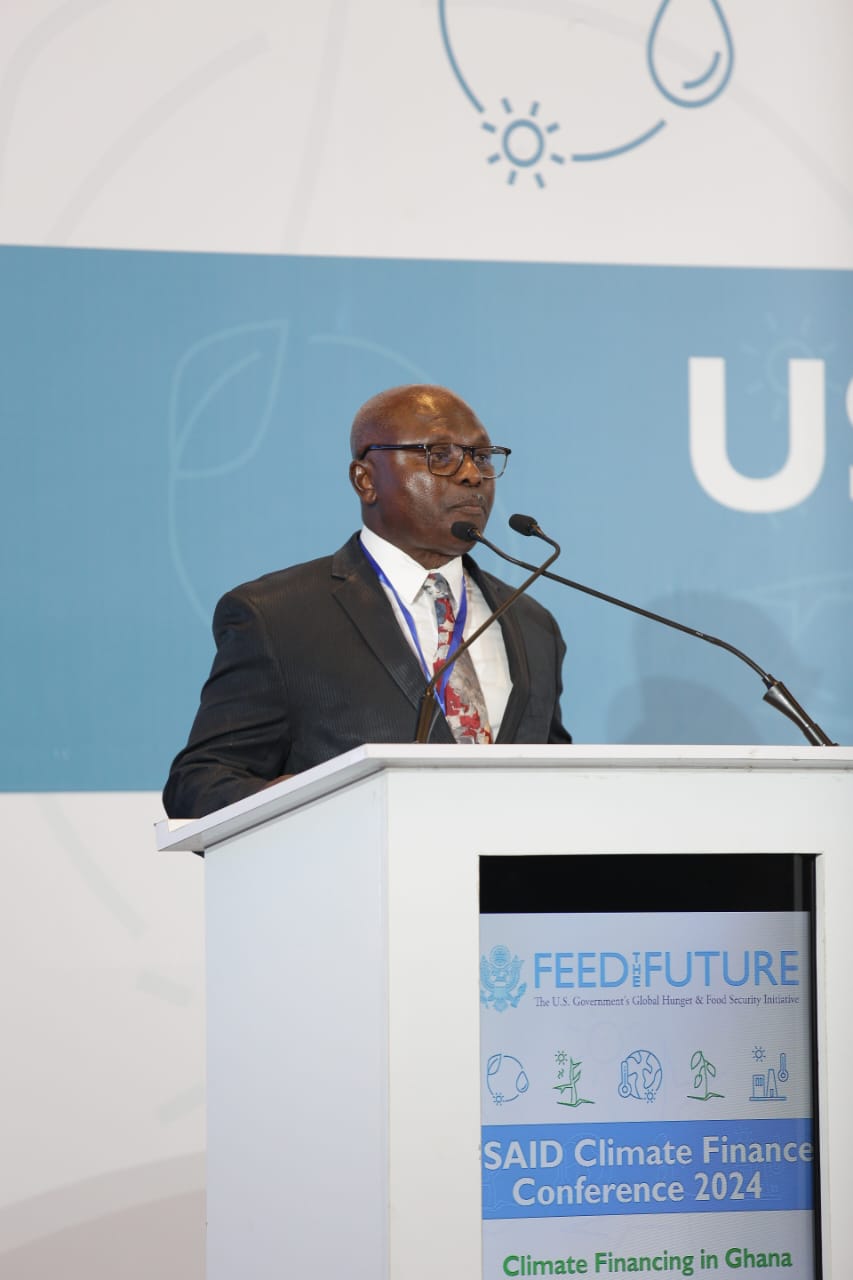
The United States Government, through its USAID-supported Feed the Future activities—Mobilizing Finance in Agriculture (MFA) and Policy Link, Africa Trade and Investment (ATI) and Market Systems Resilience (MSR) has held its first-ever Climate Finance Conference in Ghana.
The conference is aimed at empowering the government, private sector, and development partners to access investment for climate resilient practices.
The Minister of Finance designate, Dr. Amin Adam, who was represented by the Coordinating Director of the Ministry of Finance Stella Williams, noted that, in line with Ghana’s shared dedication to combating climate change, Ghana recently developed its Climate Prosperity Plan.
The plan, among others, aims to leverage Ghana’s agricultural potential to drive economic growth, create jobs, and ensure the well-being of its population while addressing environmental challenges.
These public sector led interventions notwithstanding, there is a huge opportunity for increasing market-based interventions and international investments,. Our climate finance needs are vast, and mobilizing additional resources is imperative to achieve both our climate goals and broader development objectives,” he noted.
He further noted that, market-based interventions such as carbon credits represent a significant opportunity for Ghana. Adding that, by engaging in carbon sequestration projects or adopting climate-smart agricultural practices Ghana can generate carbon credits which can then be sold on international carbon markets. This, he said, will provide the financial incentive for sustainable practices while contributing to global emission reduction targets.
The carbon market also offers an avenue for the private sector to engage in climate action, encouraging investments in green technologies and sustainable Practices across industries. By positioning Ghana as a leader in the carbon market, we will attract foreign investments, boost our economy, and enhance our resilience to climate change,” he mentioned.
He assured that with continued support from partners including the U.S. Government, Ghana will surmount the challenges of climate change, and ensure a prosperous and resilient future for the agricultural sector and the economy at large.
During her remarks, USAID Mission Director, Kimberly Rosen said, “Ghana’s economy relies heavily on agriculture, but it’s vulnerable to climate change. Building resilience is crucial for food security, poverty reduction, and economic growth, especially for the country’s growing population. To improve Ghana’s agriculture and food systems, we need new funding models and partnerships to attract investments in climate friendly solutions.” She added,
Through initiatives like the Mobilizing Finance in Agriculture activity and the Africa Trade and Investment activity, USAID is already working to address credit constraints and climate change effects in Ghana’s agriculture sector.”
Dr. Victor Antwi, Chief of Party, Feed the Future Ghana MFA Activity, said “MFA is available to provide technical assistance to entities seeking finance for climate action to prepare and present viable projects to investors. The U.S government has through USAID and the MFA Activity facilitated access to $234.44 million to 50,137 agribusinesses and farmers, 61% of whom are women-owned enterprises in the maize, soy, groundnut, cowpea, cashew, mango, and shea value chains over the past three years.
Climate change presents major risks to Ghana’s agricultural sector through rising temperatures, changing rainfall patterns, and extreme weather conditions. This phenomenon threatens the food security of Ghana’s growing population which relies on agriculture production. Agriculture remains vital to the economy of Ghana contributing over 20% to Gross Domestic Product and employing about 33% of the workforce, according to the Ghana Statistical Service.
The three-day conference will feature a plenary on the climate financing landscape, a Master Class session, panel discussions on climate smart financing opportunities and design of interventions by government and development partners. Business-to-Business meetings will also be held to connect businesses, transaction advisors, financing institutions, investors, and development partners seeking to access finance to implement interventions to mitigate climate change impacts and build economic resilience. It will close with an Action Plan for climate-smart interventions in Ghana to be implemented in collaboration with government, the private sector and development partners.
Themed “Climate Financing in Ghana: Mobilizing Resources for Adaptation and Mitigation”, the conference brought together U.S. and Ghana government representatives, non-governmental organizations, agribusinesses, transaction advisors, investors, financial institutions, trade associations, research institutions, civil society groups and the media

